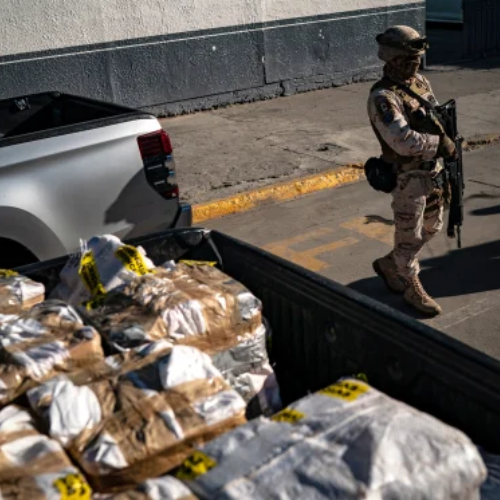A member of the infamous Sinaloa Cartel, who agreed to speak anonymously, has shared insights into the impact of President Donald Trump’s tough stance on drug trafficking, particularly fentanyl. The cartel hitman, identified only as Pablo, recently opened up during an interview with Canadian journalists. His words reveal that the U.S. government’s focus on cracking down on fentanyl trafficking has created significant fear among many cartel members, especially those involved in handling the dangerous opioid. According to Pablo, many members of the cartel are now reconsidering their involvement with fentanyl because of the growing risk from U.S. authorities.
The fear, Pablo explains, is largely due to the aggressive actions taken by the Trump administration against those involved in producing and trafficking fentanyl. He claims that this fear has caused a shift within the cartel, with some traffickers opting out of fentanyl operations. Even though fentanyl continues to be an extremely profitable drug, the pressure from U.S. authorities is forcing many to rethink their business in this highly dangerous area of trafficking.
The Deadly Profits of Fentanyl
Despite the growing fear, Pablo admits that the money involved in fentanyl trafficking is still incredibly tempting. Fentanyl, a potent opioid, has become one of the most trafficked drugs across North America, with cartels making huge profits from its illegal distribution. Although some cartel members are stepping away due to the heightened risks, many others are still lured by the huge profits they can earn from this deadly drug.
Labeled as Terrorists: Cartels Face Unprecedented U.S. Action
The Sinaloa Cartel has long been a dominant force in drug trafficking, particularly in the production and distribution of synthetic drugs like fentanyl. Pablo shared that some members of the cartel have tried to move away from fentanyl due to the increased risk of being caught by law enforcement, especially with the U.S. government’s intensified efforts. However, the demand for fentanyl, driven by its potency and low cost to produce, means that many continue to deal with it despite the dangers.
In the interview, Pablo also spoke about the scale of fentanyl production. He revealed that cartel members have set up secret labs, capable of producing staggering amounts of the drug. These hidden laboratories can manufacture between 50,000 and 100,000 fentanyl pills every two hours. The chemicals used in this process are often shipped from China, with the final product ending up in markets across the U.S. and Canada.
A Powerful and Dangerous Cartel
Although the Sinaloa Cartel has its fears about U.S. law enforcement, Pablo pointed out that the Mexican authorities don’t seem to hold the same level of power over cartel operations. While the Mexican government is engaged in efforts to fight drug trafficking, cartel members like Pablo feel they can more easily avoid Mexican authorities. According to him, the real threat comes from the U.S., whose crackdown on fentanyl trafficking has created a wave of uncertainty within the cartel.
Cartels as Terrorists: Trump’s Bold Move and the Mexican Response
Pablo’s comments shed light on the growing influence of drug cartels in Mexico, and how their operations are intertwined with global trade. The cartel’s ability to maintain power and influence over the production of fentanyl despite the government’s actions shows how difficult it is to completely eradicate drug trafficking from the region.
This sense of fear and powerlessness when it comes to facing U.S. enforcement is something that has caused divisions within the cartel. While the Mexican government might be trying to curb the flow of drugs, Pablo suggests that the cartel’s reach is far greater, often extending beyond national borders and law enforcement efforts. In fact, he emphasized that even in Mexico, it is much easier to evade the authorities than it is to escape the reach of the cartel itself.
The revelations from Pablo are a reminder of the dangerous and lucrative world of drug trafficking. Despite the government’s efforts to reduce the flow of fentanyl and other opioids, the situation remains complicated, with cartels like Sinaloa continuing to find ways to stay in business. The growing fear among cartel members of U.S. law enforcement is just one piece of the puzzle, but it illustrates the immense challenges faced by authorities trying to stop the drug trade.


